
Looming large on the agenda for the new governing board, which will have four members elected from Otago and three from Southland, will be the ongoing struggle with the deficit.
The new board, with expected revenue of $802 million this financial year, has yet to have its budget approved because of its difficulty getting the proposed deficit lower than $18.4 million.
Health Minister Tony Ryall has made it clear he wants to see the board break even by 2013-14.
He also wants to see the merger of the old Otago and Southland boards deliver more savings.
And while he approved last year's Otago annual plan with its target of cutting $5.7 million from community spending on the elderly, a cut which proved unpopular with many receiving housework support, Mr Ryall has been critical of the new board's ongoing plans to reduce spending on home support services.
The board's conundrum will be how to reach break-even without cutting services or severely restricting access to some of them, while also dealing with demands for more services in areas such as mental health.
It is not clear which board will have to consider the Director-general of Health's decision on the future of neurosurgery services in the south.
The final meeting of the old board is scheduled for December 2.
The new board will take office four days later.
Any new members would be invited to sit in on the December 2 meeting, although the new board would not be expected to meet until next year.
The expert panel advising on neurosurgery is expected to report in mid-October, but that deadline may prove difficult. No indication of when the following decision may be made has been given.
To date the board has not passed any resolutions on neurosurgery, so it is unknown if the existing or new board would accept any decision by the Director-general as binding.
This issue has put the spotlight on relationships between the board, local authorities and the University of Otago and whether there is a need for closer ties.
The Government is seeking increasing collaboration between boards and there may be some fences to mend in this regard in the aftermath of the neurosurgery row.
The board has several big projects yet to reach fruition and show that they will deliver hoped for savings and efficiencies.
Among them is the controversial new Southern Primary Health Organisation which is to come into being next month.
It is yet to be seen if it will improve the cohesion between community and hospital care, ensure better community care, and be able to take on holding the budget for community medicines, resulting in the hoped for significant decrease in costs in this area. (Southern's spending on community medicines is estimated to be several million dollars more than it should be, according to its population. )The board has been keen to reduce spending on its rural hospitals, but proposals for alternative models of care in these hospitals have some way to go.
The Lakes District Hospital proved a controversial start to this programme and any change there has been slowed while a clinical review team further consider the options.
This was one of several projects where the board's consultation process was questioned and found by some to be wanting.
Another major job for the board will be overseeing the development of a plethora of regional services using the "one service, many sites" model in the hope of securing their future financial and clinical sustainability.
While concerns about staff retention have eased a little since the global recession, the board still struggles with some hard to staff areas such as gastroenterology and the effect unexpected resignations can have on services with small numbers of specialists.
In some areas recruitment is not helped by the state of some Dunedin Hospital facilities, but this is another financial headache for the board.
The capital charges on major capital works, which can amount to millions of dollars, have to be met out of the operating budget.
In the past few months, the newly formed Southern board has been super-sized, comprising the combination of the two previous boards.
After the October election, the board will contain seven elected members with four appointments made by Mr Ryall, in common with the rest of the country's boards.
The only difference will be that Southern has two constituencies, Otago and Southland, with 11 people standing in each.
In Otago, Richard Thomson, sacked from his chairing role last year because Mr Ryall was seeking accountability for the $16.9 million fraud of the board by former employee Michael Swann, is again seeking election.
Other members seeking one of the four Otago places are Central Otago Mayor Dr Malcolm Macpherson and Balclutha GP Dr Branko Sijnja.
Also seeking election is the board's former general manager of planning and funding, health consultant Chris Fraser.
Other Otago candidates are Sophia Byles, Paul Douglas, Mary Flannery, Pat Fox, Marianne Hannagan, Chris Marlow and Graham Roper.
In the Southland constituency, where only three will be elected, five members are standing, including deputy chairman Paul Menzies, along with six newcomers. Errol Millar, who was given the Otago chairmanship following Mr Thomson's dismissal and then was appointed to the Southern chairmanship after the merger, has indicated his willingness to continue in the role, but that will be up to Mr Ryall.
• A public forum for those wishing to hear the candidates speak has been organised by the Dunedin Council of Social Services and the Public Health Association.
At this stage it is not known how many candidates will be at the meeting, which is to be held at 12.15pm on September 20, at Dunedin Community House in Moray Pl.












